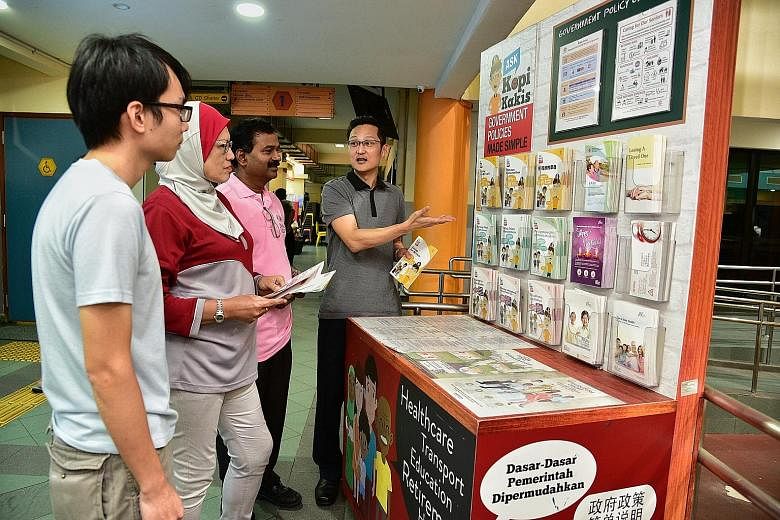When grassroots volunteer Dennis Chee, 46, visits residents' homes and attends community events in Bukit Panjang, he faces a deluge of queries on government policies that can range from SkillsFuture credits and Central Provident Fund (CPF) savings, to parental leave and estate issues.
"We have always been explaining the policies, but it was done in a haphazard and ad-hoc manner," he told The Straits Times. "We needed a more structured approach."
That gave birth to a three-man unit in 2016 that relooked how to effectively communicate policies to residents.
More than a year later, it has grown to more than 10 members.
Similar units have popped up in 67 other wards and constituencies, and the People's Association calls them communications workgroups.
"Different neighbourhoods have different demographic profiles, and each needs to be communicated to in a different way," said a PA spokesman.
With younger and more educated residents, for instance, it is helpful to explain a policy's intent - as well as trade-offs and alternatives - rather than just sharing policy information, he said.
In Bukit Panjang, the group met at least once a month last year, sharing feedback and tailoring efforts for different types of residents. This led to five sessions on CPF monies, as well as one on parenthood for a group of new home owners.
The rise of these groups follows officials' shift from a top-down to a more consultative approach in engaging citizens on policies, said Professor Augustine Pang of the Singapore Management University.
Its pace, said the professor of corporate communication (practice), has been hastened by events such as the 2011 General Election, in which the People's Action Party won, but with the lowest vote share since Singapore's independence.
A year after that election, a year-long national exercise - Our Singapore Conversation - was launched to help set out Singaporeans' ideals and aspirations for the country.
Prof Pang said the workgroups symbolise the evolution of grassroots work from broad, general concerns to specific concerns. "It goes hand in hand with what people want from the Government - which is to be heard."
Former Nominated MP Viswa Sadasivan, who was with the government feedback unit for more than 10 years, said it is "absolutely necessary at this point in time for consultation to take place".
He believes incidents such as last year's Oxley Road saga - in which Prime Minister Lee Hsien Loong was accused of abuse of power by his siblings - have affected public trust.
Keppel Offshore & Marine's bribery scandal in Brazil also shocked Singapore, which prides itself on a tough stance against corruption.
But Mr Viswa, chief executive of communications firm Strategic Moves, cautioned that workgroup members must be seen as credible - neutral and with a deep knowledge of policy issues - so that efforts do not backfire.
"If the people's confidence or trust is shaken, they become more susceptible to disinformation. When that happens, the Government is not best placed to persuade on policies," he said.
"In the current climate, neutral arbiters are critical for mediating contrary views. To be persuasive, it is best if they are from the people sector, and they must be seen to be neutral by the ground."


